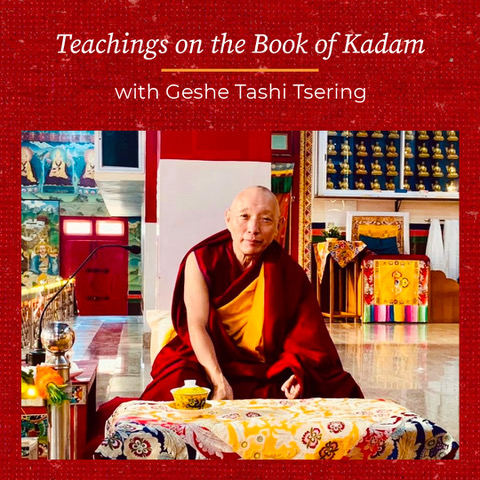In this series, Khen Rinpoche Geshe Tashi Tsering, abbot of Sera Mey monastery, gives a series of classes on a reading from The Book of Kadam, also known as The Miraculous Book of Kadam, attributed to Lama Atisha and Geshe Dromtönpa. He comments on Chapter 15 of The Jewel Garland of Dialogues: How to Train the Mind within the Expanse of Appearance, Emptiness and Empty Echoes.
As usual, Geshe Tashi’s style is part scholarly – he brings an exceptional depth of knowledge, experience and wisdom to the material; and a large part down to earth – how we can best apply these teachings to our everyday lives.
In this class, Geshe Tashi continues to guide us through the meaning of “Appearance”, “Emptiness” and “Empty Echoes”, which is part of this chapter’s title. All the Buddha’s teachings are mind trainings, Geshe la says, but these Kadam teachings are known particularly as Mahayana Mind Training or tek chen lo jong.
The main issue in this Q&A between Geshe Dromtönpa and Lama Atisha is not whether or not things exist, but the way in which things appear to us and whether we should take them as trustworthy. Things appear solid, concrete, independent, in and of themselves. This is true of mental things as much as physical things, like a concrete-seeming emotional memory.
Lama Atisha’s instruction is “do not forsake inquiry.”
We should keep probing, questioning, investigating, analysing all we experience, Geshe la says.
“What should we do if one hears insulting words?” Geshe Dromtönpa asks.
“Treat them like echoes and let go”, replies Lama Atisha.
Geshe la talks about the very common “letting go” practice, and says that to do this effectively, we need to have done our basic work on understanding impermanence, the laws of cause and effect and emptiness. Otherwise it may be painful, he says.
As an example, the way we take insulting words is often culturally linked, and can depend on the mental state behind the words. Understanding the circumstances and context is very important.
When Geshe Dromtönpa asks, “Don’t you have other methods to speak of besides this (emptiness),” the discussion turns to bodhichitta and the importance of mental strength.
“Whatever the case may be, train in this way, Drom,” says Lama Atisha, … “it is necessary.”
One of the main causes of losing bodhichitta, Geshe la points out, is backing down from serving living beings. The practice of taking and giving, then, is to build this mental strength.
The summary of this chapter is something important for us all to think about:
“Master, if one were to summarise everything, how should one do so?”
“Have faith in the law of karma and its effects, Drom.”
“Master, this [then] is a collection on echoes and illusions.”
“Drom, bring together all of these well and let it go.”
This marriage of karma and its effects and emptiness will be recognised by those who have completed the Two Truths module of the Foundation of Buddhist Thought Course. Plenty to contemplate as we wait for the next series of Sunday teachings from Geshe Tashi!
With best wishes,
The Admin Team
You can find details of upcoming classes as well as the text available for download here.
https://foundationsofbuddhistthought.org/

